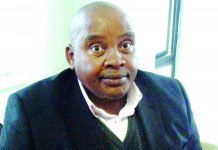Africa-Press – Lesotho. EVERY Sunday morning, the faithful members of the Healing the World church gather together singing moving hymns at their premises in Khubetsoana. A loud piano is belting beautiful melodies as a young man, wearing a suit and shiny, pointed shoes walked in.
Everyone, including the elderly, stood up in reverence and awe. But most important for the dozens of congregants is the hope, and unswerving belief that this young man holds the answers to their problems.
Some want their ailments or those of their relatives they have brought to the service healed. Others are praying for a miracle to make them rich. Others want jobs.
“Prophesy man of God,” the worshippers would intermittently shout in chorus as an animated Pastor Thabiso Mafisa told them he is God’s messenger from Matatiele in South Africa.
Referring to Bible verses, he asked them to dutifully pay the tithe (boshome), 10% of what the worshippers get on a monthly basis. He told them that coins were unacceptable.
Bank notes rained from the pockets of the worshippers, but the pastor still wanted more so he brought two more separate envelopes – one for planting (oa jala), the other for monehelo.
“I cut the spirit of coins in Jesus’ name,” he would shout whilst also marketing some “annointing oil” he claimed would cast out demons and bad luck as well as cure a host of ailments.
“You are healed in Jesus’ name,” he would shout. The pastor would tell the worshippers that he would pray for those who do not have jobs and those struggling to conceive.
“Receive your financial pregnancy in Jesus’ name,” the Pastor would say.
“We receive Pastor,” the congregation responded in unison.
Such scenes are now commonplace in Lesotho, where the prosperity gospel is taking root and nudging out of the limelight traditional Christian religions.
Most of these prophets, who are “miracle workers”, are young and are quick to flaunt their wealth which they argue is a clear sign that they are the “real Men of God”.
For them material prosperity is a sign of God’s approval. Believers are promised instant material rewards, only if they keep their side of the bargain by “giving a tithe to God”.
Their relationship to God is therefore almost transactional. The message is seductive in a country where the majority live on less than one United States dollar a day.
Critics however say the “pastors” and “prophets” who claim to possess supernatural powers are merely preying on people who are desperate for healing and wealth.
Many times, some worshippers are lined up to give testimonies of how their fortunes changed for the better after getting help from the “prophet” or “pastor”.
“I have been struggling to get a job. But since I attended this church, doors have opened,” one worshipper said amid ululations. The Pastor jumped up and down in seeming ecstasy.
These kinds of churches are also known to rebuke Basotho culture and traditions and bar followers from using herbs for medicinal purposes. Some of the Pastors approach radio stations and buy advertising space to propagate their message which quickly finds takers among Basotho.
They claim to have the power to heal and invite people to come to their churches for life-changing miracles. The growth of these churches has ignited heated debate in the country, with both supporters and critics fiercely making their point.
Many were left in shock last year when Pastor Makhado Sinthumule Ramabulana told a South African radio station, Lesedi FM, that he had used “black magic” to attract followers to his church.
He claimed that he studied theology in South Africa for three years but later left for Nigeria to study black magic together with his right-hand men. He claimed that he was advised to take the head of a pig, add some herbs to it and bury it at his church premises.
Pastor Ramabulane, who claimed to have converted, alleged that most of the churches (tsa pholoho) use evil spirits and witchcraft to pull crowds. Dr Lipalesa Mathe, a sociologist, said people have a right to believe in a faith of their choice, although people also have to work on their own to make it in life.
“If the pastors say someone will get you a job, there is no way that the person would get a job while sitting at home.
They have to look for a job and apply for it,” she said. She referred to Max Weber, one of the fathers of Sociology, and his work on the authorities of leadership.
“One of them is the charismatic leadership,” she said, giving the example of Shepherd Bushiri, the disgraced Malawian “prophet” who fled from South Africa’s criminal justice system but still attracts thousands of followers.
She said another sociologist, Auguste Comte, noted that a man has to go through three progressions: the theological stage, metaphysical stage and positive stage.
Unfortunately most people fail to make it to the positive stage because it needs scientific analysis. She said a Pastor’s job is to assess the minds and spirits of the people to convince them that certain things would happen.
Dr Mathe said people could give their money and valuables to the Pastor with a belief that they would get the riches and fortunes in return. She said because of aspirations, dreams and insecurities, people believe that what they are told and promised by pastors. Yet, in many cases, it is the pastors who make it in life. “These pastors are trying to survive,” Dr Mathe said.
For More News And Analysis About Lesotho Follow Africa-Press






